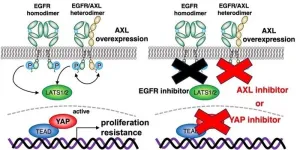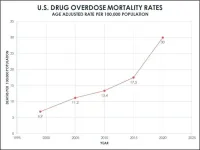(Press-News.org) Sepsis, also colloquially referred to as blood poisoning, is a serious condition. Just over 3,000 people die with a diagnosis of sepsis in Norwegian hospitals each year.
However, sepsis is not actually poisoning at all. The condition occurs when the immune system overreacts to an infection that can be caused by bacteria, viruses, fungi or parasites. The immune system attacks the organs of the body and the patient develops organ failure.
A new study of 300,000 sepsis admissions has found that the condition is more prevalent than previously thought. However, many more patients survive than previously and the increase in cases is largely due to more people developing sepsis repeatedly, rather than dying the first time they contract it.
250 in every 100,000
“Each year, 250 of 100,000 people in Norway develop sepsis for the first time,” says Lise Tuset Gustad, a researcher at the Norwegian University of Science and Technology (NTNU), Nord University and Levanger Hospital.
“We see this in the average age-adjusted rates. The rates remained stable throughout the study period but are higher than has been shown by previous studies,” she says.
The research group at NTNU's Central Norwegian Centre for Sepsis Research has looked at figures for the entire period from 2008 up to and including 2021. An article about the work has now been published in the British Medical Journal, BMJ Open.
Very strong material helps debunk myths
The researchers conducted a national registry study, which means the quality of the data is very strong. As far as the researchers are aware, this is the first time a nationwide sepsis study has been carried out over such a long period, and that includes all patients admitted to hospital rather than only those requiring intensive care.
They found 317,705 hospital admissions due to sepsis during the period from 2008 up to and including 2021. No fewer than 222,832 of the patients were admitted to hospital with sepsis for the first time.
Tuset Gustad was the main academic supervisor for Nina Vibeche Skei during her work on her doctoral degree. Skei is a consultant anaesthetist at Levanger Hospital.
“This study helps debunk the myth that an increase in the number of sepsis cases is due to greater awareness of the condition and therefore increased reporting. The proportion of people who developed sepsis for the first time per 100,000 inhabitants remained stable from 2008 up to and including 2021,” Skei, who is the first author of the paper, said.
Sharp decline in mortality
The study also found that many more people survive than before.
“During this period, mortality rates in hospitals have dropped by no less than 43 per cent for those admitted with sepsis for the first time,” Skei said.
“In total, mortality rates in hospitals have decreased by 1/3, regardless of whether it was the first time the patient had had sepsis, or if they had had it before. The cause of the decline in mortality could be increased awareness of the condition and updated guidelines for treatment,” Skei says.
Sepsis mortality increases during pandemic
During the first two years of Covid-19, the number of hospital admissions with first-time sepsis decreased. The researchers believe that this may have been due to social distancing, which resulted in fewer infections in the population overall.
“We also found that fewer people over the age of 70 were admitted to hospital with sepsis. This may have been due to the great amount of pressure on hospitals and the need to prioritize certain patient groups. These priorities resulted in many people over the age of 70 not being admitted to hospital compared to an ordinary year,” Tuset Gustad says.
“Sepsis mortality rates at hospitals increased during the pandemic,” Skei says, especially in 2021.
Covid-19 raises awareness of sepsis
Covid-19 made more people aware that infections could lead to organ failure. Many people were frightened by images of patients on respirators in intensive care units, first in Wuhan, later in Italy and eventually also in Norway. Infections, bacterial and viral, can lead to organ failure in some patients.
This is because the immune system can develop an exaggerated response to infections in certain patients. The patients may then develop sepsis, which is an infection with organ failure.
“Covid-19 put sepsis on the map. There was little awareness of sepsis caused by viral infections before the pandemic. The SARS-CoV-2 virus resulted in increased awareness of sepsis caused by the virus in particular, and sepsis in general,” Skei says.
Higher mortality rates with Covid-19 as the cause
“During 2020 and 2021, 30,000 people were admitted with sepsis, of which 2845 were admitted with Covid-19 sepsis. That is around 10 per cent,” Skei says.
Nearly 90 per cent of those with first-time sepsis developed sepsis for reasons other than Covid-19, including during the pandemic.
“However, a greater proportion of those developing first-time sepsis due to Covid-19 died,” Skei said.
More people with recurring sepsis
The figures also show that more people than previously are developing repeated bouts of sepsis.
“Hospital admissions with recurring sepsis have increased during the period. The increase is primarily due to a doubling in recurring sepsis episodes among patients over the age of 60,” Skei says.
In people over 80, recurring sepsis more than quintupled in 2021 compared to 2008.
“The cause is likely that we have become better at treating other medical conditions such as cancer and that we live longer. Patients with a weakened immune system and the elderly are more susceptible to both first-time and recurring sepsis,” Skei said.
Follow-up required
The results therefore contradict what many professionals previously believed. They believed that the increase in sepsis cases was due to changed regulations for the coding of sepsis diagnoses. But that is not the case.
“We used the same codes for sepsis during the entire study period, so we know that these are real changes,” Tuset Gustad said.
The results are likely unique both on a global level and in Norway. Previous Norwegian studies are old, the most recent used data from 2011 and 2012 and shows survival trends for sepsis for a period of two years only. This study, on the other hand, looks at sepsis trends over a 14-year period.
“Being able to distinguish between first-time and recurring sepsis is unique on a global level and this is thanks to the excellent medical registries in Norway,” Tuset Gustad said.
“Our results should have implications for clinicians and politicians — and for health policy planners. The burden of sepsis is greater than research communities previously thought. However, we do particularly need to focus our attention on the major increase in patients who develop recurring sepsis and identify preventive measures for this patient group,” Skei said.
“Health policy planners need to take these results into account. We need to make the effort to prevent recurring sepsis,” Tuset Gustad said.
The study was funded by PhD funds from the collaborative body NTNU/Central Norway Health Region and from the Nord-Trøndelag HF Health Authority.
Reference: Skei NV, Nilsen TIL, Knoop ST, et al, Long-term temporal trends in incidence rate and case fatality of sepsis and COVID-19-related sepsis in Norwegian hospitals, 2008–2021: a nationwide registry study, BMJ Open 2023;13:e071846. doi: 10.1136/bmjopen-2023-071846
END
More people develop sepsis than we thought — but more survive
The observed increase in cases is largely due to more people developing sepsis repeatedly, rather than dying the first time they contract it
2023-09-12
ELSE PRESS RELEASES FROM THIS DATE:
Mount Sinai researchers develop novel, automated measure of sleep studies to determine severity of obstructive sleep apnea
2023-09-12
Mount Sinai researchers have developed a novel, automated measure of analyzing sleep studies to determine the severity and risk of mortality in patients with obstructive sleep apnea, a chronic sleep disorder that affects about 30 million people in the United States. The study findings, which provide a validated tool to better manage sleep apnea and promote preventive care, were published in the American Journal of Respiratory and Critical Care Medicine on September 12.
The Mount Sinai Sleep and Circadian Analysis (SCAN) Group developed an automated breath-by-breath measure called ventilatory burden that assesses the proportion of small breaths during a routine sleep study. This ...
Fall snow levels can predict a season's total snowpack in some western states
2023-09-12
Spring break can be a good time for ski trips — the days are longer and a little warmer. But if people are booking their spring skiing trips the fall before, it's hard to know which areas will have the best snow coverage later in the season.
Researchers who study water resources also want to know how much snow an area will get in a season. The total snowpack gives scientists a better idea of how much water will be available for hydropower, irrigation and drinking later in the year.
A team led by researchers at the University of ...
Ten superintendents drive national initiative to champion health in schools
2023-09-12
With the start of the new school year, ten school system superintendents from coast to coast are working with the American Heart Association, a global force for healthier lives for all, to improve the health and well-being of students, families and educators nationwide. These top volunteer leaders, who are members of the association’s 2023-2024 national Superintendent Council will focus on providing guidance on how schools across the country can combat challenges that affect physical and mental well-being – contemporary issues like ...
City of Hope receives $100 million gift to create first-of-its-kind national integrative oncology program
2023-09-12
Photos, b-roll and video available for download in electronic media kit: https://t.ly/RRu-V. (Credit: City of Hope)
Event photos will be available at https://dam.gettyimages.com/assignments/city-of-hope-receives-100-million-gift.
(Event photo credit: Getty Images for City of Hope)
LOS ANGELES — City of Hope, one of the largest cancer research and treatment organizations in the United States, today announced a $100 million gift from Andrew and Peggy Cherng, philanthropists, co-founders and co-CEOs of Panda Express, to create a first-of-its-kind, national integrative oncology program that brings together Eastern and Western ...
A combination of cancer inhibitors shows success in slowing tumor growth
2023-09-12
An international team of researchers has demonstrated that a combination of inhibitors may suppress tumor growth and prevent relapse in patients with certain cancers, including head and neck squamous cell carcinoma and lung adenocarcinoma. Their findings support the future development of innovative therapeutic approaches targeting these cancers.
The team’s work is published in the journal Oncogene on August 17, 2023.
Scientists know that in humans and other mammals, the Hippo signaling pathway plays a key role in the rapid ...
In the age of ChatGPT, what's it like to be accused of cheating?
2023-09-12
While the public release of the artificial intelligence-driven large-language chatbot, ChatGPT, has created a great deal of excitement around the promise of the technology and expanded use of AI, it has also seeded a good bit of anxiety around what a program that can churn out a passable college-level essay in seconds means for the future of teaching and learning. Naturally, this consternation drove a proliferation of detection programs — of varying effectiveness — and a commensurate increase in accusations of cheating. But how are the students feeling about all of this? Recently ...
Researchers uncover NSMF protein’s role in relieving DNA replication stress
2023-09-12
A team of researchers from the Department of Biological Sciences at UNIST has achieved a significant breakthrough in understanding how brain proteins can help alleviate complications arising from DNA replication stress. This groundbreaking discovery holds immense potential for advancing treatments for various diseases, including cancer, neurological disorders, and age-related conditions that result from disruptions in DNA replication.
Led by Professor Jayil Lee, Professor Jang Hyun Choi, and Professor Hongtae Kim, this collaborative effort has unveiled crucial insights into ...
U.S. drug overdose deaths more than quadrupled from 1999 to 2020
2023-09-12
The United States is experiencing its highest overall death rates in more than a century, fueled in part by drug overdose mortality. The origins of the current epidemic are due, at least in part, to a 1986 World Health Organization pronouncement that pain treatment is a universal right. As such, cancer pain treatment guidelines were developed, which included the provision of opioids. In 1995, OxyContin was approved for the management of pain, paving the way for widespread prescription of opioids.
Researchers ...
Nicotine e-cigarettes, prescription drugs and dual nicotine replacement therapy identified as most effective stop-smoking aids
2023-09-12
Nicotine e-cigarettes and two prescription medications that curb symptoms of withdrawal are the most effective stop-smoking aids, according to a comprehensive, multinational review by a team of scientists, including a University of Massachusetts Amherst public health and health policy researcher.
Dual forms of nicotine replacement therapy (NRT), such as combining a patch with gum or a lozenge, were found to be nearly as effective.
Smoking remains the leading cause of preventable disease and death worldwide, and many people who want to quit smoking find it very difficult, due to the addictive nature of nicotine. The new study’s ...
Innovation thrives here: New report names Boston a top food tech hub
2023-09-12
In what’s known as the cluster effect, industries boom when similar businesses share a single locale. In San Francisco, there’s Silicon Valley. For cutting-edge fashion and media, there’s New York City. And according to a new report from the Friedman School of Nutrition Science and Policy at Tufts University, when it comes to innovation in food technology, Boston has become a bona fide magnet.
But what exactly is food technology, or food tech for short, and how can it solve the current food system’s most dire dilemmas?
The report from the Food and Nutrition ...
LAST 30 PRESS RELEASES:
Science reveals why you can’t resist a snack – even when you’re full
Kidney cancer study finds belzutifan plus pembrolizumab post-surgery helps patients at high risk for relapse stay cancer-free longer
Alkali cation effects in electrochemical carbon dioxide reduction
Test platforms for charging wireless cars now fit on a bench
$3 million NIH grant funds national study of Medicare Advantage’s benefit expansion into social supports
Amplified Sciences achieves CAP accreditation for cutting-edge diagnostic lab
Fred Hutch announces 12 recipients of the annual Harold M. Weintraub Graduate Student Award
Native forest litter helps rebuild soil life in post-mining landscapes
Mountain soils in arid regions may emit more greenhouse gas as climate shifts, new study finds
Pairing biochar with other soil amendments could unlock stronger gains in soil health
Why do we get a skip in our step when we’re happy? Thank dopamine
UC Irvine scientists uncover cellular mechanism behind muscle repair
Platform to map living brain noninvasively takes next big step
Stress-testing the Cascadia Subduction Zone reveals variability that could impact how earthquakes spread
We may be underestimating the true carbon cost of northern wildfires
Blood test predicts which bladder cancer patients may safely skip surgery
Kennesaw State's Vijay Anand honored as National Academy of Inventors Senior Member
Recovery from whaling reveals the role of age in Humpback reproduction
Can the canny tick help prevent disease like MS and cancer?
Newcomer children show lower rates of emergency department use for non‑urgent conditions, study finds
Cognitive and neuropsychiatric function in former American football players
From trash to climate tech: rubber gloves find new life as carbon capturers materials
A step towards needed treatments for hantaviruses in new molecular map
Boys are more motivated, while girls are more compassionate?
Study identifies opposing roles for IL6 and IL6R in long-term mortality
AI accurately spots medical disorder from privacy-conscious hand images
Transient Pauli blocking for broadband ultrafast optical switching
Political polarization can spur CO2 emissions, stymie climate action
Researchers develop new strategy for improving inverted perovskite solar cells
Yes! The role of YAP and CTGF as potential therapeutic targets for preventing severe liver disease
[Press-News.org] More people develop sepsis than we thought — but more surviveThe observed increase in cases is largely due to more people developing sepsis repeatedly, rather than dying the first time they contract it





